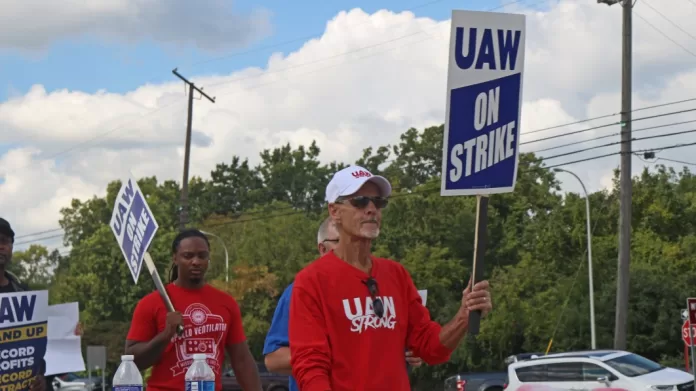The future of the automotive industry and the jobs of those involved in designing and building cars are at stake as the world shifts toward electric vehicles, according to veteran New York Times reporter Jack Ewing. In his recent article, he discusses the ongoing strike by the United Auto Workers (UAW) in Michigan and other states, framing it as a “battle” between industry powers and the union. This battle, he argues, is not just about money, but also about the role in the future of the UAW in an industry where gasoline-powered cars will become the minority.
Ewing highlights the union’s concern over job security as manufacturing moves from internal combustion engines to electric vehicles (EVs). Electric cars require fewer parts and fewer workers, which puts traditional auto workers at risk. John Casesa, former strategy head at Ford Motor, emphasizes that the transition to EVs is the central focus of the current discussion and that the union is positioning itself to play a key role in the new electric industry.
The article notes that major manufacturers such as General Motors, Ford, and Stellantis are investing billions of dollars in the transition to electric vehicles. Ewing goes as far as to call this transition the most significant technological transformation since Henry Ford’s moving assembly line in the early 20th century.
The concerns that have led to the ongoing strike are multifaceted. Industry workers fear that the shift to EVs will lead to job obsolescence due to the reduced number of parts required in electric vehicles. On the other hand, car makers argue that despite their substantial investments, they are not seeing significant profits. They claim that meeting the demands of the union could potentially bankrupt them. Ford CEO Jim Farley expressed the desire for a conversation about a sustainable future that does not force the company to choose between going out of business and rewarding its workers.
In response, the UAW shows little sympathy for the car makers, with Karl Brauer, an executive analyst at iSeeCars.com, suggesting that the union is not likely to be patient with their sob stories. Ewing also acknowledges the impact of Tesla in the industry and suggests that a favorable outcome for the union in this strike could provide leverage for organizing employees at Tesla, as well as at other nonunion carmakers such as Hyundai, which plans to manufacture electric vehicles in a new factory in Georgia.
The full New York Times article on the Future of the UAW can be found here, although a subscription may be required.
